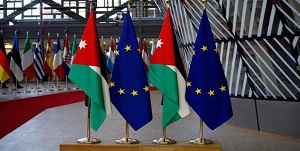U.S. to Withdraw Nearly 12,000 Troops from Germany

AFP
The United States will slash its military presence in Germany by 11,900 troops in what the Pentagon on Wednesday called a "strategic" repositioning but President Donald Trump said was to punish Berlin for its weak defense spending.
U.S. Defense Secretary Mark Esper said that the Pentagon will be sending home about 6,400 of its military personnel in Germany, and move nearly 5,600 to other NATO countries, including Italy and Belgium.
Some could also be relocated to Poland and the Baltic countries if Washington can reach agreements with them, he said.
The move, which will cost the U.S. government several billion dollars, will cut the presence of U.S. military personnel in Germany to around 24,000.
Esper stressed that the action is part of his broader plan to reposition U.S. military forces globally to better address key threats, including their combined stance with NATO against Russia.
But at the White House, Trump told reporters that Germany has not paid its fair share for the defense of Europe.
"They are there to protect Europe, they are there to protect Germany, and Germany is supposed to pay for it," Trump said of the troops.
"We don't want to be the suckers anymore.... We're protecting Germany, so we're reducing the force because they're not paying the bills."
- 'Strategic and positive shift' -
"The repositioning of our forces in Europe constitutes a major strategic and positive shift," Esper said.
"These changes will unquestionably achieve the core principles of enhancing U.S. and NATO deterrence of Russia; strengthening NATO; reassuring allies; and, improving U.S. strategic flexibility," he said.
The goal is "to enhance deterrence and reassure allies along NATO's southeastern flank," Esper said.
NATO Secretary General Jens Stoltenberg said the U.S. decision shows it is still committed to the joint defense pact.
Esper's decision "underlines the continued commitment by the United States to NATO and to European security," he said in a statement.
"As we face a more unpredictable world, we are stronger and safer when we stand together."
- Belgium, Italy to benefit -
In moves that could begin within weeks, some U.S. command operations currently in Germany will be moved to Belgium and Italy, where they will be located with their NATO counterparts, Esper said.
The planned relocation of 2,500 U.S. air force personnel from Britain to Germany has been cancelled.
The Pentagon also will move an F-16 fighter squadron from Germany to Italy, where they can help protect NATO's southeastern region near the Baltic Sea, he said.
Another command unit and U.S. troops could be rotated into Poland, Esper said, if Warsaw signs a cooperation agreement crafted by Trump and Polish President Andrzej Duda in June.
- German jobs hit -
The move could have a significant economic and strategic impact in Germany, where tens of thousands of U.S. troops have been stationed since the end of World War II.
The move could particularly hit the city of Stuttgart, which will lose the U.S. European Command headquarters and Special Operations Command Europe to Belgium
"The U.S. administration under president Trump is rushing to break off the close relationship built over decades, in a punitive action against an ally," said Stuttgart Mayor Fritz Kuhn.
Roger Lewentz, interior minister of Rhineland-Palatinate where 18,500 U.S. soldiers are based, said it would cost jobs and deal a "heavy blow" to the western German region
Earlier this month, the leaders of four German states urged the U.S. Congress to block the troop reduction, warning it could weaken the Atlantic alliance's front against Moscow.
- Trump and Merkel -
Esper said the move was long-discussed and was not the result of President Donald Trump's unhappiness with the relationship between Washington and Berlin.
Trump abruptly announced plans for the cut in June amid rising political and trade tensions between the two countries.
That came after German Chancellor Angela Merkel rejected Trump's plan to convene the Group of Seven leaders in Washington, citing the ongoing coronavirus threat. At the time, Trump maintained the virus' spread was in decline.
Angered, Trump postponed the summit and then said he would expand the group to include Russian President Vladimir Putin.
Russia was expelled from the elite group after its seizure of Ukraine's Crimea region on the Black Sea in 2014.
Latest News
-
 EU Parliament greenlights €500 million aid package for Jordan
EU Parliament greenlights €500 million aid package for Jordan
-
 Safadi, Palestinian vice president discuss Gaza ceasefire, escalation in West Bank
Safadi, Palestinian vice president discuss Gaza ceasefire, escalation in West Bank
-
 King, Lebanon president discuss regional developments
King, Lebanon president discuss regional developments
-
 Israel Defense Minister Vows to Stay in Gaza, Establish Outposts
Israel Defense Minister Vows to Stay in Gaza, Establish Outposts
-
 Cabinet suspends mandatory retirement rules, approves funding measures
Cabinet suspends mandatory retirement rules, approves funding measures